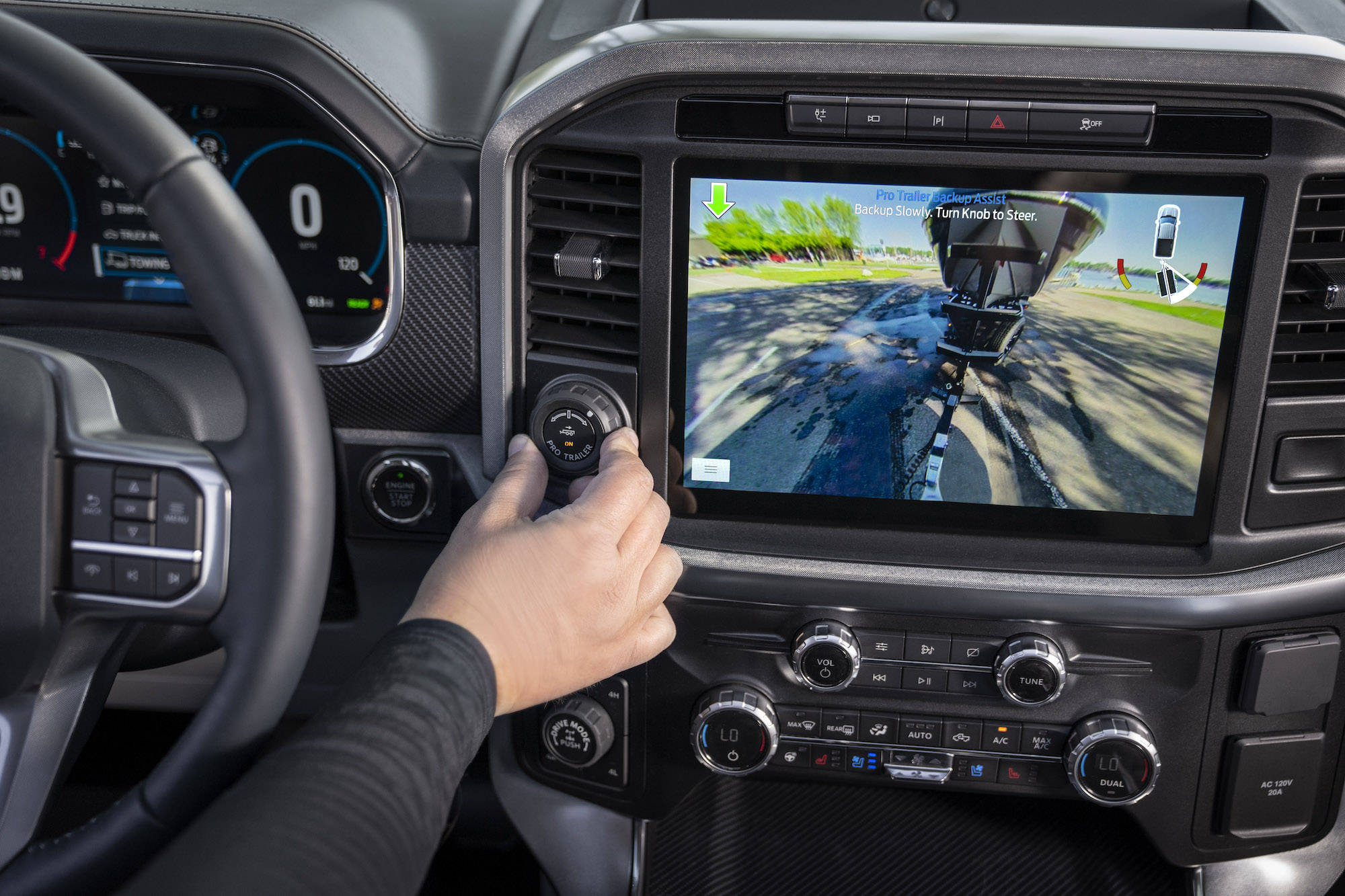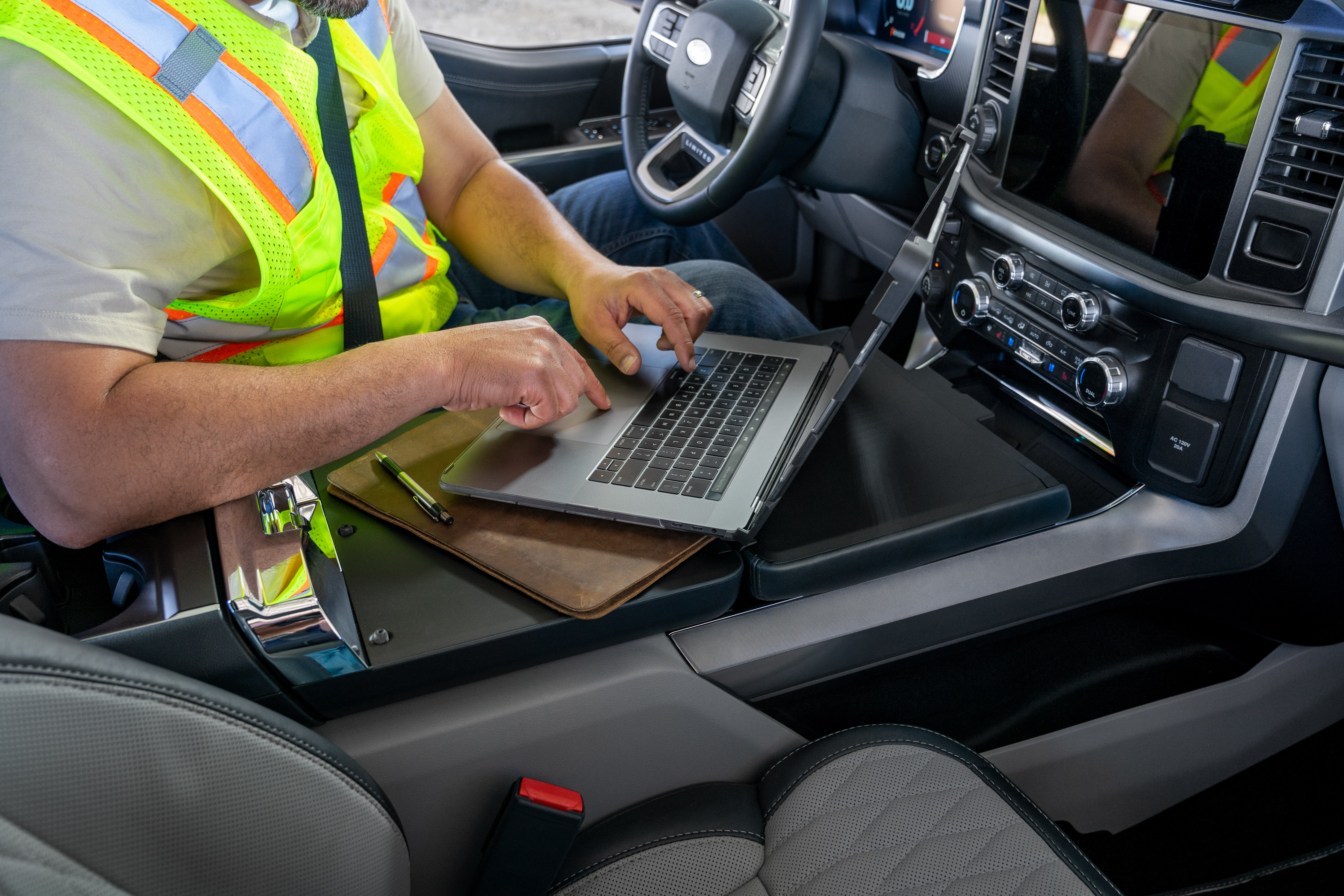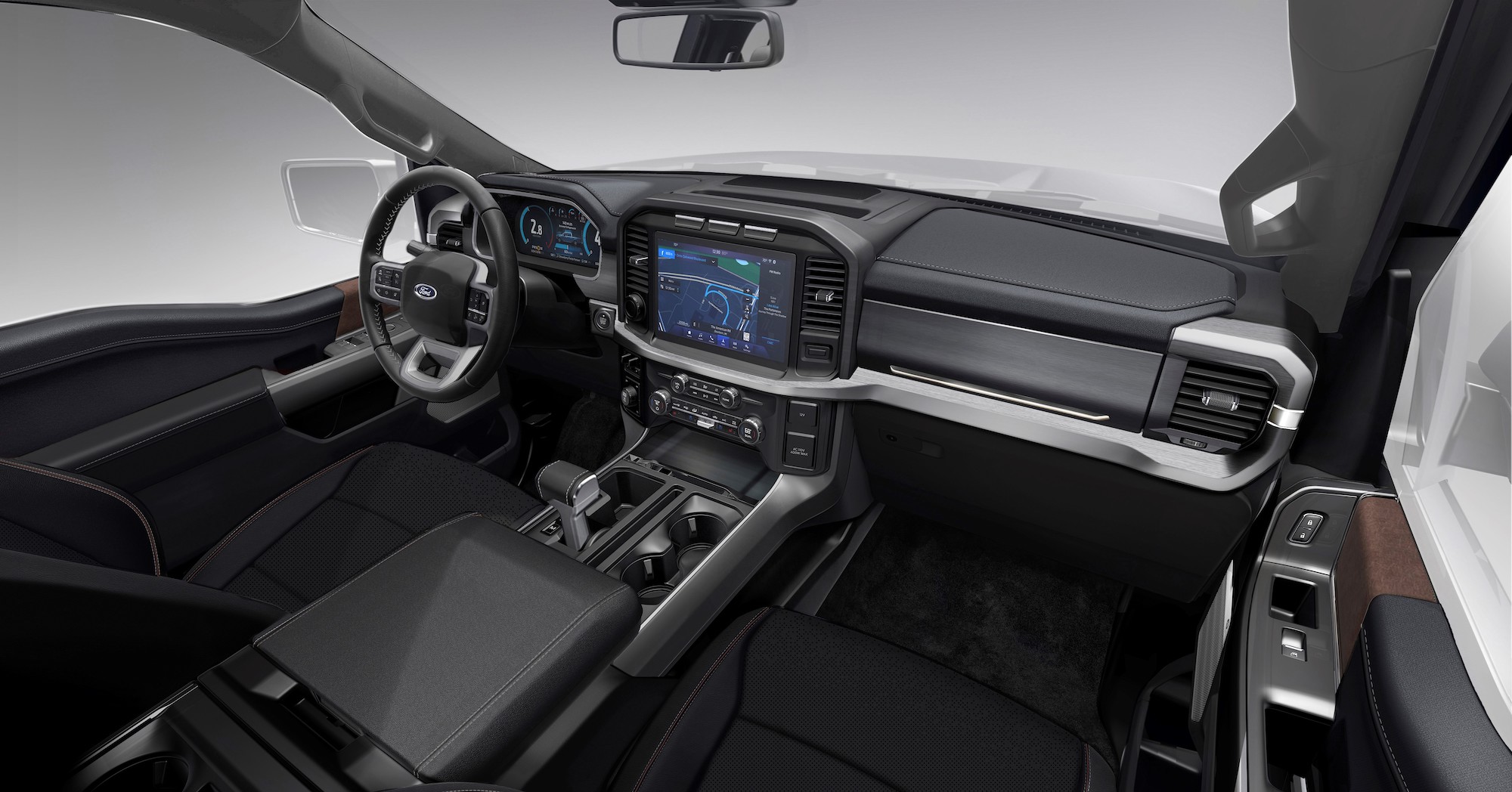Full-size pickup trucks are the meat of the U.S. automotive business; it’s a red-hot category with the Ford F-150 leading the pack in sales and the Chevrolet Silverado and Ram pickups fast followers.
But the air is thin at the top. What’s often lost in truck coverage is how fiercely automakers compete to woo discerning customers with packaged bundles of optional and standard features. And now, more than ever, those packaged bundles rely heavily on in-car tech.
Ford, as the top seller, must add bells and whistles without alienating its most discerning clientele. The 2021 F-150 — as I was reminded during a recent test drive — epitomizes this effort and hints at what is to come with the upcoming all-electric Lightning pickup truck.
I tested the 2021 4×4 SuperCrew Lariat equipped with a 3.5-liter V6 PowerBoost Full Hybrid engine in its native suburban Detroit, 20 miles from where it was developed and manufactured.
Getting the details right on pickup trucks is an art of custom packaging for car companies. It’s one of the reasons that options packages are dizzying; the F-150 I tested was no exception. The F-150 offers six different powertrains, three bed lengths and three cab options, and then there’s eight trim levels, two-wheel drive and four-wheel drive options.
This options-heavy strategy has paid off for automakers like Ford. However, as these companies add more tech and software, there is a risk of causing confusion among its most loyal customers.
Screensavers2021 Ford F-150 interior. Image Credits: Ford Motor Company
What sets the F-150 apart from other vehicles in its lineup is how much functional tech matters to its core customers. On the new model I tested, a 12-inch display that houses the standard Sync4 infotainment system is the center of the dashboard — and the customer experience.
Sync4 was introduced on the Mustang Mach-E and on the new Ford Bronco. Sync has been steadily improving for a simpler user experience since its 2007 introduction. Sync4 doubles computational power and introduced over-the-air software updates.
The system sources data from INRIX on traffic, construction (always in a Michigan summer), weather and parking space availability from data in 20,000 cities and 150 countries.
Natural language processing used in the system provided more accurate responses to my voice-based queries and incoming SMS messages. One caveat worth noting: It was difficult to judge the machine learning algorithm because my test vehicle had been used by multiple drivers in recent weeks.
For infotainment, I generally defer to Apple CarPlay, which along with Android Auto, is easy to call up, because it connects wirelessly in the F-150 and minimizes distracted driving. Ever since they debuted in production vehicles — 2014 for CarPlay and 2015 for Android Auto — it seemed inevitable that Apple and Google were going to dominate the middleware infotainment system game.
Sync also tees up supported apps Waze and Ford+Alexa.
Driving techDriving a full-size truck for the first time can be intimidating, and Ford uses camera tech to make the big rig easier to maneuver. The split screen helps a timid driver feel confident navigating through tight spaces.
Five onboard cameras act as guides that assist with steering and parking. The vivid graphics incorporated into the 360-degree view from above helps to establish bearings where mirrors won’t suffice.
Behind the steering wheel is a 12-inch digital cluster. There’s part of me that misses the old-fashioned gauges of a classic pickup, but that’s not the direction Ford is heading. Ford is striving for future-forward vibes, encapsulated by Mustang Mach-E’s Apple-design-inspired aesthetic.
Through its in-car design, Ford is trying to make the case it’s a tech company first, and a 120-year-old automaker second. These earnest aesthetic cues may be a bit too on the nose as products age over time.
Ford is due to introduce Blue Cruise, an advanced driver assistance system it once called Active Drive Assist, on vehicles later this year by an automatic software update, which was not yet active on the model I drove in June, though the hardware was included.
The company claims the system allows for hands-free driving in zones that span 100,000 miles of North American road and will be standard on the F-150 Limited vehicles in the Ford Co-Pilot360 Active 2.0 Prep Package. It will be sold as an option on Lariat, King Ranch and Platinum models. The system uses a driver-facing camera to track eye gaze and head position to monitor concentration as an answer to GM’s Super Cruise.
The doodads that matter most2021 Ford F-150’s interior work surface. Image Credits: Ford Motor Company
Under the foot-long screen are the old-school knobs and switches that show Ford knows its customers still favor a manual cue here and there. Below that is a shift lever that folds down and flat into a 15-inch workstation, which I used for some in-car laptop time.
There are ample charging stations and wireless charging throughout the cabin. While the F-150 interior is spacious, every inch of real estate is carefully thought through. Seats fold to 180-degrees for proper roadside naps or to add extra cargo space.
The dark grey leather seats felt more utilitarian than luxurious, especially for a fully loaded vehicle. (Crosstown competitor Ram tends to outdo Ford on driving joy and interior design aesthetics.) The exterior and interior design emphasizes functionality, pure and simple. I hauled two kayaks in the back and found thoughtful hooks to connect to my bungee cords in the truck bed.
A bevy of 240-volt outlets are in the rear of the truck bed and two more are onboard in the cabin. The truck bed also has a convenient ruler built in on the tailgate with both metric and imperial calculations. A 2.4 kilowatt generator is standard on the hybrid model, while the optional 7.2 kW generator functions for 32 hours on a full tank of gas.
I didn’t test out the F-150’s towing capacity, but for truck folks these numbers are essential. It has a payload of 2,120 pounds and can tow up 12,700 pounds (those numbers vary a bit depending on bed length and drivetrain). It also offers a backup towing assist function, which helps align the connection to a trailer. The model I drove was priced at $68,095, a significant leap from the $50,980 base price. In contrast, Ford produces an even higher-end F-150 trim called the Limited, which starts at $73,000.
Function in formBefore it goes all electric, the hybrid powertrain gives Ford a much needed boost to compete with Ram and Chevrolet, which already sell hybrid variants. The hybrid option is a logical compromise for customers who aren’t ready for the full Lightning EV that will go on sale in 2022, a launch that’s already generated buzz and 120,000 pre-orders. I clocked about 24 miles per gallon, an improvement over all-gasoline and best in its class for non-diesel. It’s still not enough to get Ford anywhere close to a stellar emissions report card, which is why the Lightning matters so much.
Ford F-150 Lightning electric pickup reservations surpass 120,000
In order to court new EV customers, Ford must appease its current buyers who buy all those trucks we see on the road today. There’s two kinds of pickup truck customers: Those who rely on the functionality for their daily vocation or the weekend warriors and those who seek out the capability in case they might need it in a disaster scenario. The truck that I drove does the job of appealing to both.
The F-150 has always been suited to buyers who use it for home improvement projects, outdoorsy hobbies and towing. Pickup trucks also support laborers that require a rugged, functional vehicle. When Ford introduces anything new to this model, it creates hype and high stakes on how these customers feel about tweaks.
2021 F-150 Lariat interior in black. Image Credits: Ford Motor Company
The buyer who seeks security came to mind while I had the F-150 on loan in late June, which is why I’ve saved the part about how it drives for last. My test drive period coincided with a summer storm that pummeled Michigan and shut down major highways and left vehicles stranded for days.
Before the storm, I zoomed around town, adjusting to the big loose steering and wide turns and the rhythm of stillness that occurs as the hybrid engine regenerates.
Once the storm came, I eased off the throttle and into a steady and sure pace, hands at 10 and two. Passenger cars and lesser capable crossover SUVs floated by me in two feet of water on the Lodge Freeway. The F-150 plowed through the muck, unbothered. I didn’t experience any skidding or stalling, in contrast to one friend who was forced to walk home because her Uber driver got stuck. The F-150 feels like a test case for a survivalist in an environmental catastrophe. The backup generator is the added security blanket.
Full-size trucks have an innate quality to make a driver feel invincible, which at the end of day is why people love their F-150s, and why the company has gotten so much mileage off that “Ford tough” tagline. It’s a delicate balance, keeping an unfussy truck at a price point that delivers power, substance and peace of mind.














